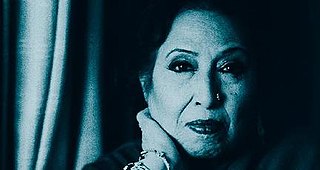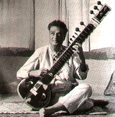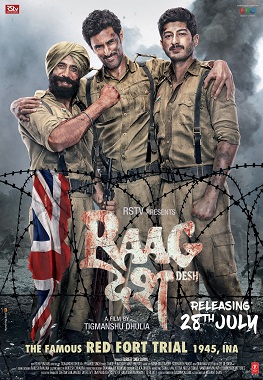Raag may refer to:
- Raga, a melodic framework in Indian classical music
- Raag (film), a 2014 Assamese-language drama film
- Raag (surname)
- Radio Amateur Association of Greece
- Right-angled Artin groups, in geometric group theory
Raag may refer to:
A pentatonic scale is a musical scale with five notes per octave, in contrast to heptatonic scales, which have seven notes per octave.
Rag, rags, RAG or The Rag may refer to:

Iqbal Bano was a Pakistani singer who specialized in ghazal. She is popularly known by her honorific title Malika-e-Ghazal(The Queen of Ghazal) in both Pakistan and India. She was known for her semi-classical Urdu ghazal songs and classical thumris, but also sang easy-listening numbers in the 1950s films. In 1974, she became the recipient of the Pride of Performance award.

Khwaja Khurshid Anwar was a Pakistani filmmaker, writer, director and music composer who earned recognition in both India and Pakistan. He is credited as being one of the most original and inventive music directors of his generation. He was the Programme Producer (Music) at (AIR), All India Radio or Akashvani, Delhi in 1939.

Begum Parween Sultana is an Indian Hindustani classical singer of the Patiala Gharana. She was awarded the Padma Shri in 1976 and the Padma Bhushan in 2014 by the Government of India and the Sangeet Natak Akademi Award by the Sangeet Natak Akademi in 1998.
Darbari Kanada, or simply Raga Darbari, is a raga in Carnatic music. It is a janya ragam of 20th Melakarta raga Natabhairavi. Being an ancient raga, its original name is unknown. It is believed to be borrowed into Hindustani classical music by Miyan Tansen, the famous 16th-century composer in emperor Akbar's court. It belongs to the Kanada family. This tradition is reflected in the name itself; Darbar is the Persian derived word in Hindi meaning "court." As the most familiar raga in the Kanada family, it may sometimes also be called Shuddha Kanada or pure Kanada. It belongs to the Asavari thaat. This raag is called raaga Kaanada in Yakshagana Karnataka state dance. It is also sometimes written as Durbari and Durbarikanada.

Aaroh is an alternative rock band from Karachi, Sindh, Pakistan, formed in 1998. The band was founded by keyboardist Kamran Khan and lead guitarist Nabeel Nihal. , who were joined by, Vocalist Farooq Ahmed, Bassist Khalid Khan and Drummer Adnan Hussain.

Ilmar Raag is an Estonian media executive, actor, screenwriter and film director, best known for his socio-critical film The Class. He was CEO of Estonian Television from 2002 to 2005. He is a well known columnist in many prestigious Estonian newspapers. He has written many scripts and directed critically acclaimed films, notably August 1991 and The Class.
Pandit Jnan Prakash Ghosh was an Indian harmonium and tabla player from Farukhabad gharana of Hindustani classical music and musicologist.

Yaman is a heptatonic (Sampurna) Indian classical raga of Kalyan Thaat.

Abdul Halim Jaffer Khan was an Indian sitar player. Khan received the national awards Padma Shri (1970) and Padma Bhushan (2006) and was awarded the Sangeet Natak Akademi Award for 1987.
Stanford Raagapella is Stanford University's South Asian focus a cappella group. The group was founded as an all-male group in 2002 and transitioned to an all-gender group in 2017. Stanford Raagapella has released three albums to date, Raags to Riches, Raag Time and Raagstars. Raagapella regularly performs on campus in events hosted by the group itself as well as by organizations such as Stanford Sanskriti, the South Asian cultural organization. Stanford Raagapella has toured the United States and India, performing with artists such as A.R. Rahman. The group's repertoire consists of world music, much of which originates in India and Pakistan, and Western songs.
Tansen is a 1943 Indian Hindi language film directed by Jayant Desai, featuring K. L. Saigal and Khursheed Bano in the lead roles. The film was based on Tansen, the 16th century musician in the court of Mughal emperor, Akbar. The film featured 13 hit songs, performed by the leads, including "More Balapan Ke Saathi", "Rum Jhum Rum Jhum Chal Tihari", "Kahe Guman Kare Gori", "Bina Pankh Ka Panchhi", "Sapt Suran Teen Gram", "Diya Jalao" and "Baag Laga Doon Sajni". It was the second highest grossing Indian film of 1943. In 2009, it was reported that another film based on the life of Tansen would be directed by Satish Kaushik.

Raag is a 2014 Indian Assamese-language drama film, starring Adil Hussain and Zerifa Wahid in the lead roles. The film was directed by Rajni Basumatary and produced by Assam State Film Corporation Limited in association with Manna Films. The film was initially released on 7 February 2014 in the state of Assam and later on 7 March 2014 in selected theaters across rest of India via PVR Director's Rare.

Mohit Marwah is an Indian actor who works in Bollywood films. He is best known for his debut feature film Fugly (2014) and Raag Desh (2017). He has also appeared in short films such as Strangers in the Night produced by Dharma Productions and directed by Shakun Batra and in Love Shots produced by Yash Raj Films.
Rajni Basumatary is an Indian filmmaker and actress, best known for her role of Mary Kom's mother in the 2014 Hindi film Mary Kom. Basumatary has written and produced the highly acclaimed feature film Anurag. Her directorial debut Raag was released in all major cities in India in 2014.
Raag is an Estonian surname. Notable people with the surname include:

Raag Desh is a 2017 Indian historical action drama film directed by Tigmanshu Dhulia and produced by Gurdeep Singh Sappal and Rajya Sabha TV. The film is based on Indian National Army trials, the joint court martial of Indian National Army officers Colonel Prem Sahgal, Colonel Gurbaksh Singh Dhillon, Major Shah Nawaz Khan on charges of treason against the British Empire during World War 2. The leading roles in Raag Desh have been played by Kunal Kapoor, Amit Sadh, Mohit Marwah and Mrudula Murali. The film was released on 28 July 2017. Rishi Punjabi is the cinematographer of the film.
Gara is a Hindustani classical raga belonging to the Khamaj Thaat. This raga is similar to raga Jaijaiwanti. Both ragas i.e. raga Jaijaiwanti and raga Gara, have the same svaras. Gara is a rare raga. It is rendered in the late evening. The raga uses all the seven notes, six in the ascent and seven in the descent. Therefore, the Jati of the raga is Shaadav-Sampurna. While some say that seven svaras are played in the ascent and seven in the descent. Therefore, the Jati then becomes Sampurna-Sampurna. It uses both, the Komal (flat) and Shuddha (full) Nishad, and all other notes are Shuddha (full). The derivative ragas out of this structure are grouped under the broad head of Khamaj Thaat. Gara belongs to a family of melodic entities, which were apparently derived from folk melodies, and entered art-music in association with the thumri genre. This family includes ragas like Kafi, Piloo, Jangula, Barwa, and Zilla, along with several others. This raga expresses the feeling of happiness and satisfaction of achievement, however it simultaneously conveys the sadness of losing. This raga is also a vivacious and romantic one.
Nathu Khan, was a Pakistani sarangi player known for introducing solo sarangi playing tradition with difficult phrases. He was associated with Radio Pakistan and Pakistan Television Corporation. He was also associated with All India Radio before emigrating from India.